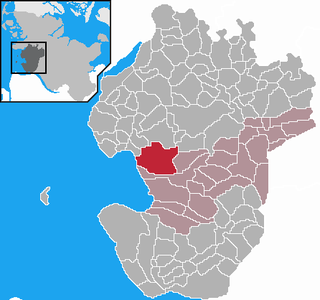Ostholstein is a district in Schleswig-Holstein, Germany. It is bounded by the districts of Stormarn, Segeberg and Plön, the Baltic Sea and the city of Lübeck.
Segeberg is a district in Schleswig-Holstein, Germany. It is bounded by the districts of Pinneberg, Steinburg and Rendsburg-Eckernförde, the city of Neumünster, the districts of Plön, Ostholstein and Stormarn, and the city state of Hamburg.

Holstein is the region between the rivers Elbe and Eider. It is the southern half of Schleswig-Holstein, the northernmost state of Germany.

Hinrich Lohse was a Nazi German politician and a convicted war criminal, best known for his rule of the Reichskommissariat Ostland, during World War II. Reichskommissariat Ostland now comprises Lithuania, Latvia, Estonia, and parts of modern day Belarus.

Molfsee is a municipality in the district of Rendsburg-Eckernförde, in Schleswig-Holstein, Germany. It is situated on the river Eider, approx. 1 km southwest of Kiel.
The 18th Division was a unit of the Prussian/German Army. It was formed on October 11, 1866, and was headquartered in Flensburg. The division was subordinated in peacetime to the IX Army Corps. The division was disbanded in 1919 during the demobilization of the German Army after World War I. The division was recruited primarily in Schleswig-Holstein.
The following is a list of jarls and dukes, who ruled over Schleswig respectively Southern Jutland (Sønderjylland).

Nordermeldorf is a borough in the district of Dithmarschen, in Schleswig-Holstein, Germany.

The Schleswig-Holstein Landtag is the state parliament of the German state of Schleswig-Holstein. It convenes in the state's capital Kiel and currently consists of 73 members of six parties. The current majority consists of a "Jamaica coalition" of the Christian Democratic Union, The Greens and the Free Democratic Party, supporting the cabinet of Minister President Daniel Günther.

Holstein Switzerland is a hilly area with a patchwork of lakes and forest in Schleswig Holstein, Germany, reminiscent of Swiss landscape. Its highest point is the Bungsberg. It is a designated nature park as well as an important tourist destination in Northern Germany situated between the cities of Kiel and Lübeck.
John II of Saxe-Lauenburg was the eldest son of John I of Saxony and Ingeborg Birgersdotter of Småland, a daughter or grandchild of Birger jarl. He ruled Saxony jointly with his uncle Albert II and his brothers Albert III and Eric I, first fostered by Albert II, until coming of age. In 1296 John II, his brothers and their uncle divided Saxony into Saxe-Wittenberg, ruled by Albert II, and Saxe-Lauenburg, jointly ruled by the brothers between 1296 and 1303 and thereafter partitioned among them. John II then ruled the branch duchy of Saxe-Mölln, later extended to become Saxe-Bergedorf-Mölln. In 1314 he officiated as Saxon Prince-elector in an election of a German king.
Albert III (1281–1308) was a member of the House of Ascania who ruled as one of the dukes of Saxony from 1282 until his death.
Eric IV of Saxe-Lauenburg was a son of Eric II, Duke of Saxe-Lauenburg and Agnes of Holstein.
Francis I of Saxe-Lauenburg was the eldest child and only son of Duke Magnus I of Saxe-Lauenburg and Catherine of Brunswick-Wolfenbüttel, daughter of Duke Henry IV the Evil of Brunswick and Lunenburg (Wolfenbüttel). Francis I succeeded his father in 1543 as duke of Saxe-Lauenburg, but resigned in favour of his major son Magnus II in 1571. Two years later he reascended and was succeeded by Francis II in 1581.

Francis II of Saxe-Lauenburg, was the third son of Francis I of Saxe-Lauenburg and Sybille of Saxe-Freiberg, daughter of Duke Henry IV the Pious of Saxony. From 1581 on he ruled Saxe-Lauenburg as duke.
The Schleswig-Holsteinische Wörterbuch is a regional dictionary of the Low German language in the dialects used in the state of Schleswig-Holstein i.e. Schleswig, Holsteinish and Hamburger Platt and their sub-dialects. The publisher and co-editor was the Germanist, Otto Mensing.
Rudolf Bülck was a German librarian.

Schule am Meer, Engl. School by the Sea, Hebrew בית ספר ליד הים, also known as S.a.M. or SaM, was a private, holistically oriented coed progressive boarding school on the East Frisian island of Juist in the Free State of Prussia of German Reich, located between Wadden Sea and North Sea.







